They’ll have a music of wet streets / and lonely bars where piano notes / follow themselves into a forest of pity and are lost.
When I was 17, I saw a man on cable television chase a green Volkswagen Beetle until he slammed headfirst into a pole. He didn’t see the pole because he almost had his hands on the car. He was almost as fast. Also as big, almost. The shot of the man falling after he runs into the pole is full of beautiful slants and heights—leafless branches, latticed tower, streak of cloud, dazed knee—that can only feel as much like winter as they do when propped on top of all that flat. Flatness of a color that might introduce itself as green, and you’re like sure, dirt, whatever you say, we already met but don’t worry about it, this time you’ll get your act together.

The shot was directed by Alison Maclean, whose cinematographer was Adam Kimmel. How they made that shot was first they read Denis Johnson’s book Jesus’ Son. I bought the book after I watched the movie to make sure it was Billy Crudup’s voice that was annoying and not the words.
 In the book, the words were in sentences full of glow and ache and the proud civility of the self-fucked, the calm leak of “Excuse me, there’s a knife in my eye.” And also of course the weeping and calling bartenders your mother. They were words about clouds that looked like brains, but they were also words like “help” and “stay” and “save.” Those little words forever hitchhiking back to church and never making it all the way. Paragraphs would interrupt themselves to turn to you. I was 17 and hadn’t read Levinas or Buber, and yet here was the “you” that knew the face on the other end was always dark. Little words like “search” and “name.” Paragraphs that interrupted their description of a shriek to tell you they have gone looking everywhere. For the shriek, they mean, but mostly it’s the gone, and the looking, and the everywhere.
In the book, the words were in sentences full of glow and ache and the proud civility of the self-fucked, the calm leak of “Excuse me, there’s a knife in my eye.” And also of course the weeping and calling bartenders your mother. They were words about clouds that looked like brains, but they were also words like “help” and “stay” and “save.” Those little words forever hitchhiking back to church and never making it all the way. Paragraphs would interrupt themselves to turn to you. I was 17 and hadn’t read Levinas or Buber, and yet here was the “you” that knew the face on the other end was always dark. Little words like “search” and “name.” Paragraphs that interrupted their description of a shriek to tell you they have gone looking everywhere. For the shriek, they mean, but mostly it’s the gone, and the looking, and the everywhere.
A voice smart enough to hear its own narcissism but still stuck at the age where it can’t believe all the things it gets to feel and hear and see to the point where it doesn’t care at all how slurry it sounds to use a word like “glorious,” a voice that slackjaws around in a sheepskin coat calling everything terrible and beautiful like Oprah’s and-you!-get-a-car-and-you!-get-a-car. Back and forth between wide arms and self-hugging and shivering the whole time and I was 17. Even though I knew the Goo Goo Dolls singing “and you bleed just to know you’re alive” was kind of stupid, it didn’t feel that way. Here was an unironic hallelujah named after a song by a band I went out and listened to because of this book. Here was a blurb from some guy named Barry Hannah, so I read him too. Hallelujah. READ MORE >
Retreat Left

This is going to be long. I will discuss politics in the dangerous context of business and try to compare Seattle and New York, but I will go astray. You’re warned. I spent a long time to fix the structure of this essay. This first bit is about my vocation and leads into a bit about leaving New York. I think I wanted to give the political parts a level of context. It’s hard to read about politics if you don’t know what it comes out of.
Setting A Scene In A Bar
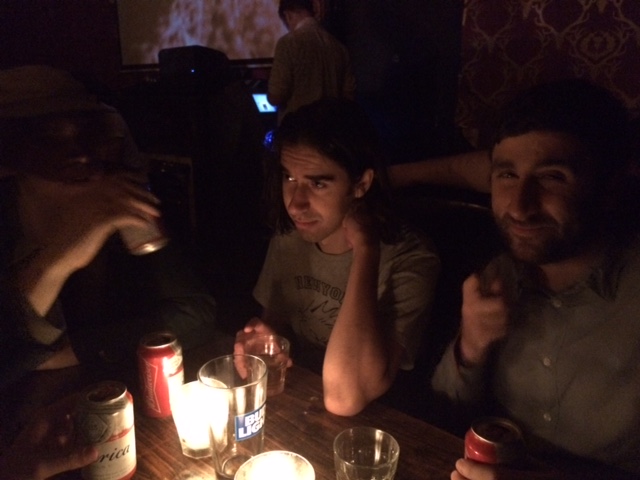
Alaska Bar during the week it closed. Photo by Erik.
New York City, NY (resident 2010-present)
Ontario Bar
This is a classic dive with a suspicious Canadian theme. It sits across from a very fine Indian restaurant (fare of the northwestern subcontinent) on a long stretch of Grand Street in East Williamsburg, with many other bars–dives and otherwise. My normal procedure here is to drink a lot of whiskey sodas and say some friendly things to whomever is around. When I first moved to New York my colleague Bobo encouraged me to go to Ontario Bar, I think because it had more of a cozy neighborhood vibe (at the time) than places nearer to Bedford Avenue. He could sense that I missed smaller-city dives? In addition to serving other bartenders, staff are known to be friendly to dull-eyed, lonely men who work in production and creative services. It’s not a bad business model in Williamsburg. I once heard a bartender complain that she only makes money between the hours of three and four. Close later and change the whole experience of the night. READ MORE >
It’s All Good I’m Not Amy Goodman

Russia won the US Elections, white supremacists/fascists/military dictators toasting their BFF heart necklaces in a pyramid scheme, DAPL accepting donations for legal sanitary and emergency purposes, high school students and college students demand sanctuary cities and sanctuary campuses as sites of refuge from fascists, McCarthy-era Submit a Tip watch list compiled by a herd of Sound of Music golden Trump Youth a.k.a Turning Point, families torn apart by white nationalist swamp monsters, Obama somehow became the nation’s First Therapist, deportation trauma continues to swirl, more islands disappear into wrathful unforgiving waters, refugees have nowhere to go despite this one planet, endless slavery and the incarcerated state, $50k Thnxgiving dinners for 8 in Manhattan which is about the same average of graduate student debt in education, science, and arts, the undying click holes of inertia (dance with me, won’t you?), scam universities, the fake news problem, scam everything, the doctrine of legitimacy, elephants still being trained to paint, dolphins be painting too, paranoia as wish-fulfillment, unaffordable Buddhist retreats, warmer degrees, the rising tide of far right conspiracy theory cults, State says literacy is not a right in Detroit, while NYC to spend 1 million per day on Trump security, and a few days ago in Chicago Angela Davis reminded a crowd that “community is the answer.”
Service and Disservice – An Interview with Julia Phillips
I met Julia Phillips several years ago via the tangled web of my polite, friendly, professional Brooklyn-based friends. She was a big part of editing my 2015 book, Popular Photo. Julia is a fiction and nonfiction contributor (respectively) to Glimmer Train, The Antioch Review, The Toast, Brooklyn Volume 1, Buzzfeed, Jezebel, The Rumpus, Slate, The Cut and The Awl, to a few. I admire her ability to bring immediacy to (somewhat? very?) remote subject matter and her descriptions of the narrative approach to specific people, places, characters, communities. Read more from her via Twitter at @jkbphillips. We conducted this interview using email. My questions in bold. READ MORE >
November 21st, 2016 / 12:24 pm
Observations

Female paleontologists contributed to the community of inclusion by donning beards for field selfies. Donald Trump’s odds of winning slouched to zero as diehards threatened revolt and the Times reported his assessment of Arsenio Hall in the 00s: “Dead as dog meat.” A middle-aged man realized marijuana does not contain inspiration. Two hours later he forgot. The American hacker Jester told CNN he posted a message on the homepage of Russia’s Ministry of Foreign Affairs telling the country to go to its room. Former FBI agents call him Batman.
Scientists flooded a population of E. coli with a compound derived from cypress trees to see if it would shed its antibacterial-resistant transposons. It did. A woman in Coeur d’Alene, Idaho drove through a carwash five times in a row because she is in love with the feeling of detached time and the simple beauty of blue soap. “It’s cheaper than therapy,” she said, “and my car is so clean.” A sociologist in North Carolina argued that censorship today is not defined by withholding information, but by giving it directly to the public. In 20,000 pages of email WikiLeaks told us that John Podesta thinks former New Mexico governor Bill Richardson “can be a dick.” Richardson tweeted that he didn’t care.
A brown maple leaf slowly fell, draping the body of a dead squirrel like a blanket. A PhD candidate at Cambridge attributed the creation of Frankenstein, as well as the bicycle, to the distinct lack of summer in 1816. Astrophysicists lost a round of hide and seek with dark matter. No one knows why capuchins crack stones together just to lick the dust. This may be the last election dominated by baby boomers. People began to worry about a weaponized internet of things. All over the world people walked around dressed as creepy clowns. An elderly man in Fresno, California said, “That’s enough.” Then he sat exactly where he was, watching Jeopardy as steam rose from a humidifier in front a house plant. The light of the TV reflected the windows around him. Night fell and he was alone.
20 Points: When a Lady (Shakes Hands With a Gentleman)
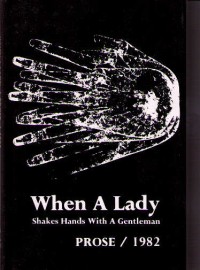 |
When a Lady Shakes Hands With a Gentleman
by Nikolai Bokov, Mark Insingel, Gertrud Leutenegger, Claude Ollier
Red Dust Books, 1982
96 pages / $8.95 buy from Amazon
|
1. Throughout the course of When a Lady, a very engaging 1982 collection from Red Dust, Inc, the contributors display a rigorous commitment to the avant-garde tradition of de-automatizing perception, as outlined by Shklovsky, and broken down like a boss here by A.D. Jameson
2. The Belgian novelist/ Concretist poet Mark Insingel reworks aphorisms and banal lanuage tropes.
3. “When a lady shakes hands with a gentleman (plucks out a gentleman’s eye) she does not remove her glove.”
4.
5. “How can the drop that made the cup run over be the same as the drop to which the cup is drained? (How can the drop to which the cup is drained be the same as the drop that made the cup run over?)”
6. “A Loves B who loves C who is adored by D, the only concern of E who wants to get rid of F who is courted by G who receives attentions from H, the idol of I who would be content with J who cannot leave K in peace who will not part from L who would prefer to go to M who has gone off with N who cannot forget O who would like to go back to P who has an eye on Q who would gladly be wooed by R who is making advances to S who is only interested in T who likes U, U need not despair at any rate (V, W, X,Y,Z).”
7.
8. Insingel looks for entrenched meanings and potentialities. He is repetitive, and redundant, and often very funny. The big blocks of mutable text ultimately represent his project, a sort of frustrated response and working with and through degraded language.
9. “Rare is beautiful/Rare is wonderful/Rare is awful./Rare is horrible./Rare is incomprehensible./Rare is possible./ Rare is deniable./ (You don’t have to accept it as true, you are not obliged to see it (it isn’t being thrown into our teeth), you need not have anything to do with it (go into it) it can’t frighten you at all (the chances are much too small), you can dream about it (wet dreams—nightmares), you can actually have a cozy chat about it.)”
10. Claude Ollier, explores sensations connected with memory images. In his project he interrogates some of the “word as signifier” aspects of language, dwelling on strange associations and essentially personal multiplicities in words.
July 17th, 2014 / 12:00 pm
On Udaff.com
Live lousy fucking in the world.
My head hurts a hangover
And in a pocket nor spear, fucked,
Pass the bottle fucking empty
Only them, of course, is not enough.
I fucking, fucking, do not,
I would only hangover
And then all the shit, shit,
And on the wall, fucked, smudge …
This proverb – not a fairy tale,
Tale will be ahead fucking:
This is the beginning of the earliest extant post published in the “Creatives” section of the Russian website Udaff.com, the title translated by Google Translate as “Lewd tale about global catastrophe” (“Непристойная сказка про мировую катастрофу”). Udaff.com describes itself as a repository of counter culture literature. It’s named after the site’s administrator, Udav (Udaff being a faux anglicisation), who posts new works almost every day in categories including News, Creatives (fiction and poetry), Controversy, Book Reviews and many others. The Creatives section, with over 50,000 entries since the site launched in 2000, is the most popular, featuring poetry and fiction that ranges widely in length and content, but is generally short and often serialized.
July 14th, 2014 / 10:00 am
Let’s Overanalyze to Death… A little girl from Kyrgyzstan
About a year ago, a YouTube user called stos2408 posted a video entitled маленькая девочка дирижирует хором, Little Girl Conducting the Choir. As you might expect, it shows a little girl conducting a choir.
The video is just 64 seconds long and yet it is mesmerizing, inimitable, absolutely beautiful. It is hilarious and dumb and true in a way that art isn’t readily able to duplicate. A stolen moment from a choir practice in Kyrgyzstan – or so we learned later, when an enterprising journalist tracked down stos2408 and found out where this kid lived, where these singers sang, where stos2408 was sitting when he imported the video from his camera to his computer, appending a Cyrillic title, uploading it to the world.
June 7th, 2014 / 10:00 am
A Conversation with Philip Graham
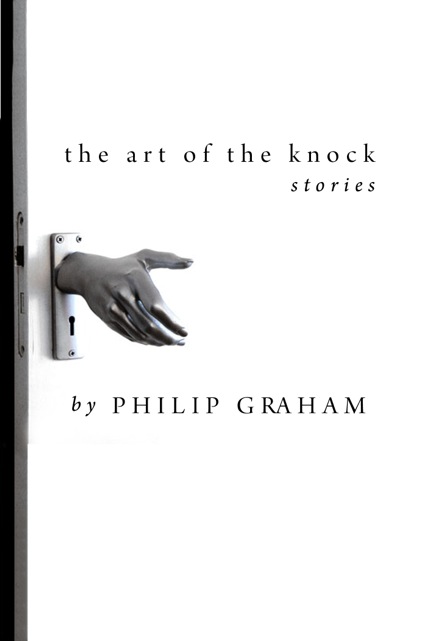
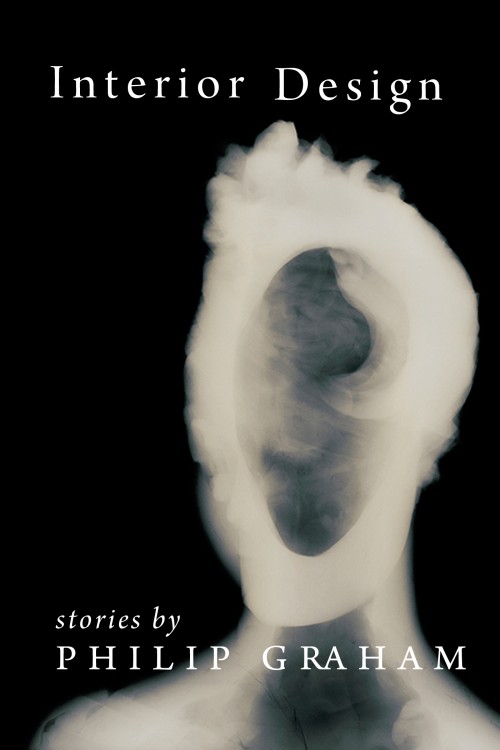
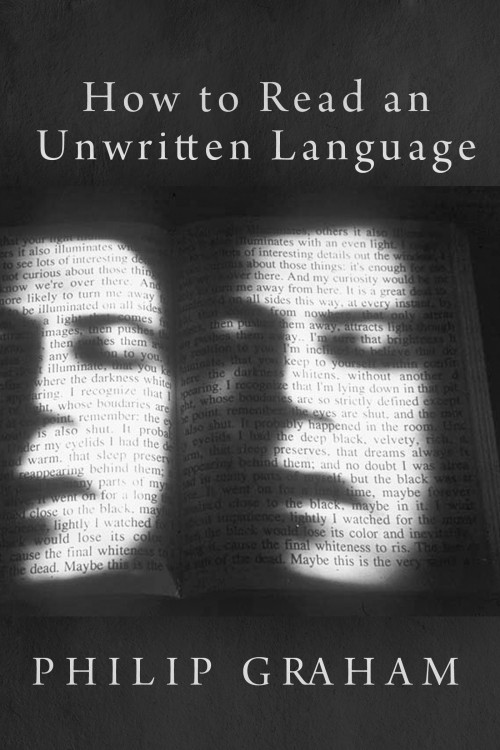 Three of Philip Graham’s early books are newly available in Dzanc/Open Road ebook editions. Graham asked me to write the introduction for one of them, The Art of the Knock, and while I was working on it, I asked him a few questions to satisfy my curiosity about his years working with Donald Barthelme and Grace Paley, his time in Africa, and his thoughts on symmetry and design, which are influenced in part by the poetry of Charles Simic and the plays of William Shakespeare.
Three of Philip Graham’s early books are newly available in Dzanc/Open Road ebook editions. Graham asked me to write the introduction for one of them, The Art of the Knock, and while I was working on it, I asked him a few questions to satisfy my curiosity about his years working with Donald Barthelme and Grace Paley, his time in Africa, and his thoughts on symmetry and design, which are influenced in part by the poetry of Charles Simic and the plays of William Shakespeare.
Kyle Minor: I’ve just finished re-reading The Art of the Knock, the book that first brought you to the attention of many readers. I was struck by its symmetries of design, a thing that seems to have been a preoccupation of yours. So many story collections are simply a grab bag, a greatest-hits-lately. But The Art of the Knock is, first and foremost, a book. The parts are in conversation, and they are arranged like a series of Chinese boxes, or Russian matroyshka dolls, on the one hand, and on the other, they are directional. We begin with digging through toward China, and we land in China. We go through three iterations of the “Art of the Knock” series. And the rest of the stories are nested in two in-between sections that seem mirror images one of the other, or at least they are in conversation. How did you find the form of that book? Did you write your way into it, or did the design arrive first?
Philip Graham: Actually, The Art of the Knock grew out of a combination of the two approaches. I’d just published a first book of prose poems, The Vanishings, and my new work was tending toward the short story form. I’d written the first China piece, the first Art of the Knock story (though at the time I didn’t consider them part of a series, they just were what they were), and a few of the family stories—“Silence,” “Shadows,” and “The Distance.” I was simply working my way into a new book, and didn’t have a definite sense of what it might become. READ MORE >
